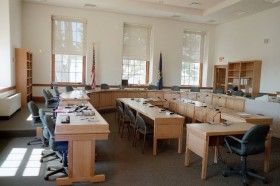The legislature was established: in 1820 “To make and establish all reasonable laws and regulations for the defense and benefit of the people of this State, not repugnant to the Constitution, nor to that of the United States.” Maine Constitution, Article IV, Part Third, Section I.
It consists of a 35 member Senate and a House of Representatives with 151 members, all elected to two-year terms. With “term limits” enacted by popular referendum in 1993, a member may serve only four consecutive terms in one legislative chamber, after which he or she must not serve for one full term. Thereafter, the member may again run for a seat in that chamber.
Arguments against term limits, in addition to limiting voter choice, include the loss of experienced members and less continuity of legislative leadership, including a high turnover of Speakers of the House.
However, many “term limited” legislators continue their service by running for election to the other chamber: House members for the Senate; Senators for the House. Since 1820, Speakers have served only one-year terms; with a few exceptions, that tradition continues. (Beginning with statehood in 1820, legislators served one-year terms until a constitutional amendment in 1880 changed the terms to two years.)
Both House and Senate districts are reapportioned every ten years, based on the decennial population census, to keep them approximately equal in population. In recent years, the reapportioned districts have taken effect with the second election after the census year; however, beginning with the election of 2012, reapportionment is in effect with the first election after the census year.
Both houses must agree for legislation to be passed and sent to the governor, who may veto or accept it. A “veto” is a “no vote” by the governor. If two-thirds of each body (the House and the Senate) approve the legislation after a veto, it becomes law. It either body does not support it by at least two-thirds, the legislation does not pass.
The Maine Legislature operates under Reed’s Rules of Parliamentary Procedure. Developed by Thomas Bracket Reed, the rules were intended to “be comprehended by persons who may be called upon to preside over meetings of deliberative bodies, and by those who may desire to participate in the proceedings.”
Legislation may be a new law, an amendment to an existing law, a resolve expressing the wishes of the Legislature, a proposed bond issue, or a proposed constitutional amendment. The governor may not veto a proposed constitutional amendment, which goes to the voters for their final approval.
Committees do the detail work of holding public hearings, frequently revising proposals before recommending action to the full legislature. The legislative process follows specific rules and procedures.
The most powerful committee is that on Appropriations and Financial Affairs, the “Appropriations Committee.” It not only closely reviews the State Budget, but also passes on any proposal that involves the expenditure of funds. The Committee has its own staff of budget experts to assist it. This Office of Fiscal and Program Review provides non-partisan financial information to the Legislature, legislative committees, legislators, other legislative staff, department representatives and the public.
Long a male dominated institution, women legislators have increased their membership in recent decades and have gained positions of leadership and power.
Elections are held in even-numbered years, except to fill vacancies that may require a special election in an odd-numbered year.


